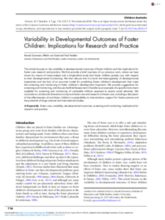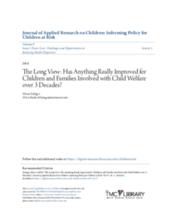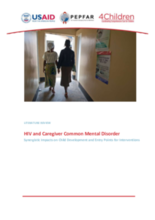Displaying 221 - 230 of 485
This exploratory paper’s purpose is to determine the effect of demographic, risk, and protective factors on social-emotional development, as measured by the Ages and Stages Questionnaire Social Emotional (ASQ:SE), in children age 8 months to 5 years in out-of-home care in Ontario, Canada.
The Nurturing Care Framework provides a roadmap for action. It builds on state-of-the-art evidence about how early childhood development unfolds and how it can be improved by policies and interventions.
This article presents an overview of the few studies carried out so far in the European residential institutions, including children’s homes, over the years 1940–2011 in the UK, Germany, Romania, and Poland.
This article focuses on the variability in developmental outcomes of foster children and the implications for foster care research and practice.
The Nourished and Thriving Children toolkit was designed by SPOON to build capacity among the foster care community in feeding and nutrition topics so that they are equipped to address challenges commonly experienced by foster children.
Reframing Early Childhood Development and Learning is a communications toolkit for building public support in Kenya for better child development policies and programmes.
This paper reflects on: what’s better or not after 30 years; whether legislation and financing are aligned with child welfare’s goals of safety, permanency and well-being; and what remains to be done to improve the outcomes of children and youth in foster care or otherwise involved with child welfare.
For this study, physical and mental health, school achievement, justice involvement and child protection contact were explored for three cohorts of children in Australia born between 1 January 1990 and 30 June 1995.
In this paper, the authors review published literature on the mental health status of mothers living with HIV (MLH) and how this affects their children; outline the pathways between maternal HIV, maternal mental health problems, and negative child outcomes; and then describe a number of intervention entry points that they argue have the potential to enhance impact across PEPFAR platforms.
This note and the accompanying full technical paper examine the existing evidence and the potential for bringing together cash transfer programs and parenting interventions to improve child development outcomes, notably cognitive performance.







